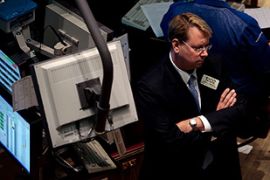US senate set to vote on bailout
Markets relatively calm as investors await decision on $700bn plan to rescue financial sector.

US financial markets also saw relative calm on Wednesday after a week of wild swings, from Monday’s plunge following the bailout plan’s first rejection to Tuesday’s 500-point rally.
The Dow Jones blue chip index closed nearly 20 points or 0.18 per cent down and broader indicators were also slightly lower, with the Standard & Poor’s index of 500 stocks dropping 0.45 per cent and the technology-heavy Nasdaq falling 1.07 per cent.
Financial turmoil
Weeks of financial turmoil were sparked after several major US financial institutions collapsed or were forced to the brink of bankruptcy following losses sustained in the subprime mortgage crisis, when people accepted loans they were later unable to repay.
| IN DEPTH |
|
Economic analysis of bailout rejection Fighting against US foreclosures |
Other global financial institutions have been caught up in the crisis, which has caused chaos on global markets.
The senate vote was called late on Tuesday, after Democratic and Republican negotiators agreed on the terms of the amended bailout, which includes extended tax cuts for businesses.
In another new measure, the bill, which requires 60 votes in the 100-member senate to pass, raises the limit on federal insurance for bank deposits from $100,000 to $250,000.
“I’m hopeful that tonight we’ll see a strong vote in support of this plan and bipartisanship shown in the senate today will spark the House of Representatives to do the same,” Harry Reid, the Democratic leader of the senate, said.
“The security and well-being of the American people are at risk and we have to work together to solve this crisis.”
Tax breaks
Barack Obama, the US Democratic presidential candidate and Illinois senator, told the senate that while the plan was not perfect, it needed to be passed.
“It’s clear that, from my perspective, that this is what we need to do right now to prevent the possibility of a crisis turning into a catastrophe.”
John McCain, the Republican candidate, also left the campaign trail to return to Washington for the vote.
| IN VIDEO | ||
|
The amended bill retains most facets of the original plan which gives Henry Paulson, the US treasury secretary, the power to buy failing mortgage-related assets from troubled banks and includes restrictions on pay-offs to financial executives.
Opponents of the bill have expressed concerns over handing that much power to one man, and reject the idea of using taxpayer money to bail out disgraced Wall Street firms.
Steny Hoyer, the Democrat leader of the House of Representatives, raised concerns that some of his fellow Democrats who originally voted for the bailout might reject it over the senate’s extension of expired tax breaks for businesses.
“There’s no doubt the tax package is very controversial. The senate, in my opinion, is adding that on because they think that’s the only way they can get it passed,” Hoyer told NBC news.
George Bush, the US president, also urged senators to pass the bill to stabilise financial markets.
“The bill’s different, it’s been improved, and I’m confident it’ll pass.”

